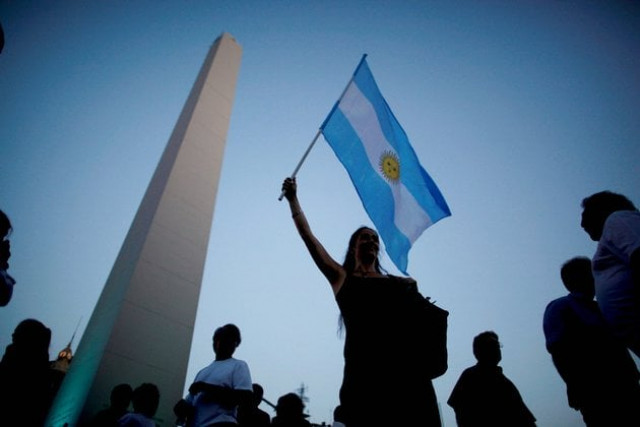Argentina pays 'vulture funds' to end debt saga
The payment ends a decade-long battle in the US federal courts

PHOTO: REUTERS
The payment ends a decade-long battle in the US federal courts and should enable the South American country to finally lay to rest the ghost of its 2001 default, the largest in history at the time -- nearly $100 billion.
"The republic has made full payment in accordance with the specific terms of each such agreement" with holdout creditors who had successfully sued the country, Argentina's lawyer said in a statement to the court.
Argentina to borrow cash again, 15 years after default
Judge Thomas Griesa then gave his official blessing, lifting an injunction he had slapped on the country that effectively blocked its deals to restructure its debt until it settled with the holdouts.
Argentina forked over $6.2 billion to settle disputes with 20 creditors. It is due to pay another $3.1 billion in the coming days to settle lingering claims.
The move comes after Buenos Aires raised $16.5 billion in a momentous return to international credit markets, with most of the proceeds going toward repaying the holdouts.
"The payments made today to the funds in litigation totaled $9.3 billion. The total of all payments is estimated to reach $10.5 billion, accounting for 44 percent of all legal claims," the finance ministry explained in a statement.
Doubtful: IMF: Greece finance plans not realistic
Griesa's decision also "allows payments owed to bondholders from the 2005 and 2010 debt swaps, and this will be implemented within the next three weeks," it added.
Paying off disgruntled creditors -- especially New York hedge funds NML Capital, a unit of multi-billionaire Paul Singer's Elliott Management, and Aurelius Capital Management, which led the lawsuits against the country -- will draw the curtain on a long drama that had hurt the Argentine economy.
The case also raised crucial questions about contracts and the rights of both borrowers and lenders in the massive and largely unregulated global sovereign debt markets.
The payments concluded a delicate legal and financial dance that required creditors to trust they would be paid by the new Argentine government of President Mauricio Macri, according to settlements negotiated in February.
The creditors were mistrustful after Macri's predecessor Cristina Kirchner had for years refused to deal with them.
The conflict dates back to Argentina's devastating economic crisis in 2001, when the collapse of its dollarized economic model forced the country to default on its debt.
Nearly all its creditors eventually agreed to take losses of up to 70 percent on their bonds in a restructuring that was meant to allow the country to get back on its feet.
But seven percent of the creditors, the so-called holdouts, refused. NML and Aurelius, which have pioneered the business of buying up cheap defaulted sovereign bonds and suing for full payment, led the campaign to take the country to court.
Griesa ruled in the hedge funds' favor in 2012. Kirchner appealed the case all the way to the Supreme Court, but never managed to overturn the New York judge's ruling.
Even so, the leftist president refused to pay, arguing it was unfair to the majority of creditors and labeling the hedge funds "vultures."
But with Argentina stuck in a prolonged economic slowdown, Macri, a business-friendly conservative, pulled off a come-from-behind election win in November.
He took office vowing to get the economy back on track, notably by settling the bitter debt dispute.
Brexit could shrink UK economy by six percent: Treasury
US Treasury Secretary Jacob Lew heaped praise on Macri after the debt payment, which he called "a testament to the sea change in policy" and "the product of Argentina's new direction."
"Argentina is turning a page on a difficult period of its history," he said in a statement.
"I have reiterated our admiration for the speed at which Argentina is moving to create more sustainable and inclusive economic growth, and to reconnect with the global economy and the world community."
Singer, the hedge fund billionaire long vilified by Kirchner, also recently heaped praise on Macri in Time magazine's list of the world's 100 most influential people.
He wrote Macri's brief profile for the issue, praising the new president's moves to devalue the puffed-up currency, seek foreign investment and end the debt dispute.
"Macri still has important tasks ahead of him, including taming inflation. But if he lives up to his promise, Argentina may finally do the same," he said.
Singer had the biggest payday of any creditor Friday: his NML Capital received $2.4 billion.
That amounted to an estimated return of 369 percent on the fund's original investment.



















COMMENTS
Comments are moderated and generally will be posted if they are on-topic and not abusive.
For more information, please see our Comments FAQ